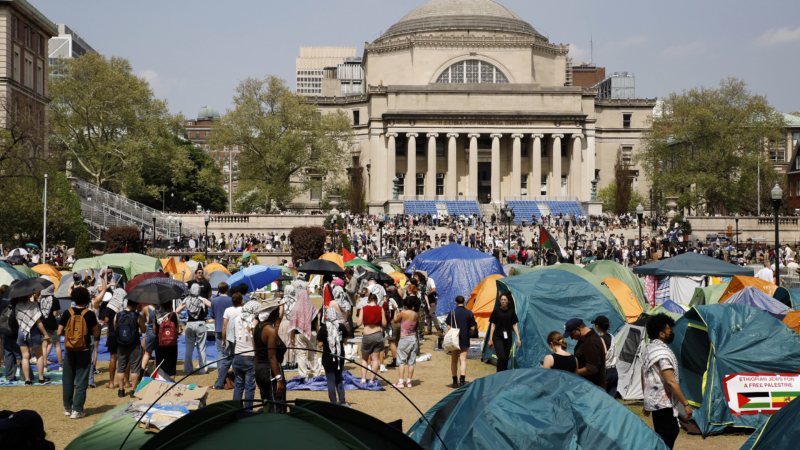Weaponizing antisemitism makes students ‘less safe,’ says drafter of definition
The Trump administration is taking a hardline approach to what it alleges is a failure to protect students from antisemitism on college campuses.
The administration canceled $400 million in federal funding to Columbia University, claiming the school failed to address antisemitism on campus. The Department of Education also sent letters to 60 colleges and universities, warning they are under investigation for accusations of antisemitism.
Kenneth Stern, director of the Center for the Study of Hate at Bard College and the lead drafter of the International Holocaust Remembrance Alliance’s working definition of antisemitism, said the administration’s approach is making Jewish students feel less safe. The administration adopted Stern’s IHRA definition in its executive orders.
“It puts pro-Israel Jewish students in a situation where they may be seen as trying to suppress speech rather than answer it,” Stern said.
He also said that the definition is being distorted and used to silence anti-Israel critics. He was the lead drafter of the definition in 2004-2005 to help European countries have a common definition to track data on antisemitism. Then it was officially adopted by the International Holocaust Remembrance Alliance in 2016.
Stern acknowledges the existence of antisemitism on campuses but believes that the Trump administration’s approach could create a much worse situation.
He noted that while most Jews, including himself, are Zionists, there is a growing number of younger Jews whose understanding of Judaism leads them to an anti-Zionist position. While he would debate the political implications of this shift, he would not label them as antisemites.
After the conversation was recorded, NPR reached out to the White House for comment. Principal Deputy Press Secretary Harrison Fields replied, “The only people weaponizing antisemitism are the liberal activists pushing Hamas propaganda on colleges and across our nation. President Trump is committed to holding these radical agitators accountable and deporting non-citizens who are conducting this behavior.”
This interview has been lightly edited and condensed for clarity.
Interview highlights
Leila Fadel: Now the Trump administration has repeatedly said it is going to root out antisemitism specifically on college campuses. Canceling 400 million dollars in federal funding to Columbia and telling 60 colleges they’re under investigation for failing to protect Jewish students. What do you make of that claim and the actions?
Kenneth Stern: I think it’s a total assault on the university, which has been a very important institution for Jews over the last number of decades. JD Vance had talked about following the playbook of [Victor] Orban in Hungary on dealing with education. I think that’s what we’re seeing unfold.
We’re seeing an attempt to not do things like saying, OK, we’re going to make a distinction between actual harassments, true threats and so forth. We’re going to go after the views of people and hurt the university that way. I mean, the case with Khalil…
Fadel: Mahmoud Khalil is the green card holder who was a protest leader at Columbia and was detained.
Stern: What they basically said is he was handing out pro-Hamas propaganda. Well, excuse me. I don’t like pro-Hamas propaganda, but that’s speech. And when you start saying that we’re going to go after people whose speech we don’t like, for nothing more [expressing an opinion we don’t like], that’s the predicate. Where does that end?
To me, one of the things that’s important for our ability to combat antisemitism and other forms of hate is having strong democratic institutions. When we’re assaulting free speech, that’s McCarthyism. We don’t have strong democratic institutions anymore.
Fadel: So are you saying then that the administration is weaponizing antisemitism?
Stern: Yes, it’s absolutely weaponizing antisemitism. It’s not to say that there isn’t antisemitism on campuses. There have been horrible situations. But look at what they’re not doing and what they’re doing.
Look back to the Biden administration. It had a very detailed, comprehensive, national strategy for combating antisemitism that had buy-in across the Jewish world. That’s no longer the case.
Fadel: And like you point out, there is real antisemitism and a rise in antisemitism. Does this approach make students any safer?
Stern: No, it makes them less safe. When I teach, and I teach about antisemitism and I teach about Israel and Palestine, I want students to be able to say what they think. I want to create a space where they feel comfortable to be wrong and experiment with ideas. If we don’t have that as the core of the American educational enterprise, we’re going to suffer tremendously in the long run.
Ally Schweitzer edited the audio version of the story.
Rideshare union rights, social media limits and other state laws taking effect Jan. 1
Every new year, public media reporters across the country bring us some of the new state laws taking effect where they are. Here are six in 2026.
Guides to help you tackle your New Year’s resolutions
From building your strength to tackling credit card debt, NPR's Life Kit has a newsletter journey to help you tackle your New Year's resolution.
Guides to help you tackle your New Year’s resolutions
From building your strength to tackling credit card debt, NPR's Life Kit has a newsletter journey to help you tackle your New Year's resolution.
Dozens presumed dead in fire at Swiss Alps bar during New Year’s celebration
Dozens of people are presumed dead and about 100 injured, most of them seriously, following a fire at a Swiss Alps bar during a New Year's celebration, police said Thursday.
Crypto soared in 2025 — and then crashed. Now what?
For most of 2025, cryptocurrencies such as bitcoin surged as President Trump vowed to make the U.S. a crypto leader. But now, a severe sell-off has shaken the sector.
Warren Buffett officially retires as Berkshire Hathway’s CEO
The legendary 95-year-old investor spent decades building his company into one of the world's largest and most powerful. Now Greg Abel is taking it over.






